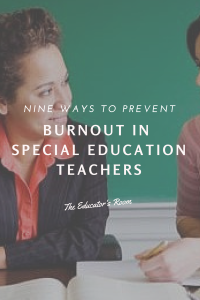 I recently wrote an entry on my other blog about how I intended to embrace laziness this year, amongst other things, because I feel that I work so hard that I often run myself into the ground. I work hard in my personal life, as the parent of a child with autism, but I work even harder at my job as a Special Educator. I confess that I find it hard to honor that promise to myself. I often stay up past midnight working, drop into bed exhausted, and then drag myself out of bed the next day to give my all to my job. I do everything I can to prevent burnout, but it can get difficult.
I recently wrote an entry on my other blog about how I intended to embrace laziness this year, amongst other things, because I feel that I work so hard that I often run myself into the ground. I work hard in my personal life, as the parent of a child with autism, but I work even harder at my job as a Special Educator. I confess that I find it hard to honor that promise to myself. I often stay up past midnight working, drop into bed exhausted, and then drag myself out of bed the next day to give my all to my job. I do everything I can to prevent burnout, but it can get difficult.
I received comments on my blog from many people, several of whom included other special education teachers. One person told me to give myself a break because this job gets exhausting. One person told me she betted I would not be lazy this year. Some of them read my blog regularly and know that I’m almost incapable of this “laziness” I claim I’m going to embrace. Yet, I’m determined I’m going to get closer to this concept. I must if I’m going to teach better. To me, taking the time to relax and even enjoy my family often feels lazy, and it shouldn’t because if I’m going to stay in this job and not burn out, I need my health. Quite frankly, so do you. As difficult as it seems, you must fight against teacher burn-out harder than other teachers. I took some time to coming up with some strategies since I needed them too, so you won’t need to spend your time researching ways to help yourself. Just do it.
9 Simple Ways to Prevent Burnout in Special Ed Teachers
- Pick a time to leave work and then do it. There’s no award for last car in the parking lot. Believe me. I’ve never received it. It’s somehow liberating to actually leave work at 4:30 sometimes instead of 5:30 or 6:00. And if you’re leaving later than that, you really need to get out of there.
- Leave your work at home. To save myself from feeling like a complete hypocrite because I feel this task is completely impossible now, I’ll say to try to leave it at home at least three times a week. Give yourself some breathing room. If you need to stay a bit later those days so that you don’t haul your stuff home those nights, do it. Just leave your work at work.
- Eat well. This seems unimportant, but it means more than you think. If you eat crap, you’ll feel like crap. Eat nothing, and expect your energy level to drop. Pack a lunch with protein, fruit, and a vegetable. A sandwich with tomato and lettuce and a piece of fruit will work. Just don’t skip lunch.
- Get moving. Even if you just walk up and down the hall a couple of times at work. Sometimes as special education teachers we get cooped up in our own little rooms and that alone feels miserable. Come out of your little hole and move around. Get some fresh air if you can. Interact with an adult or two if you see some. It does help!
- Look for the positive! I created a list of positives and just added to it every day. I probably should get back to it. I’ve also gotten my students into bringing me three positives a day because some of them had gotten pretty negative. It helps! They stopped putting the negatives out there and have become more thoughtful about what’s positive. Add some positives to your life so you not only look forward to work again, but you see what’s good about everyday life.
- Redecorate and/or Reorganize. Something about freshening up the classroom makes things look so much better. Maybe it’s time to change the bulletin board or put up some new posters. Maybe reorganizing things would help. I always feel better when I know things are put back in order. Even just switching a couple of posters around helped make me feel better the other day. You never know!
- Brighten Someone’s Day. Send a positive note home, call up a parent or grandparent, or genuinely tell a student how much better they’re doing. The positive impact you make on someone else’s day giving them the good news often makes you feel that much better. When’s the last time you had a parent thank you? Surely that phone call would elicit the positive response you need to not only lift someone else up, but pick you up too.
- Help Some Colleagues. Does another teacher need help with a project or need mentoring? Do you have tech knowledge that someone else doesn’t? What can you do to help another teacher out, even if it’s just providing a positive word of encouragement? Oftentimes, knowing I’ve helped someone else makes me feel better on a bad day.
- Take Care of Yourself. Get enough sleep, rest when you’re sick, and know your limits. Your physical status has a major impact on how well you react to things emotionally. If you want to be the best teacher, you must take care of yourself. Sometimes that does mean taking time for yourself.
Avoiding teacher burnout in times of increasing responsibility and stress means that we must stay diligent. These 9 strategies should go a long ways toward preventing burnout, even for the most exhausted special education teacher.




